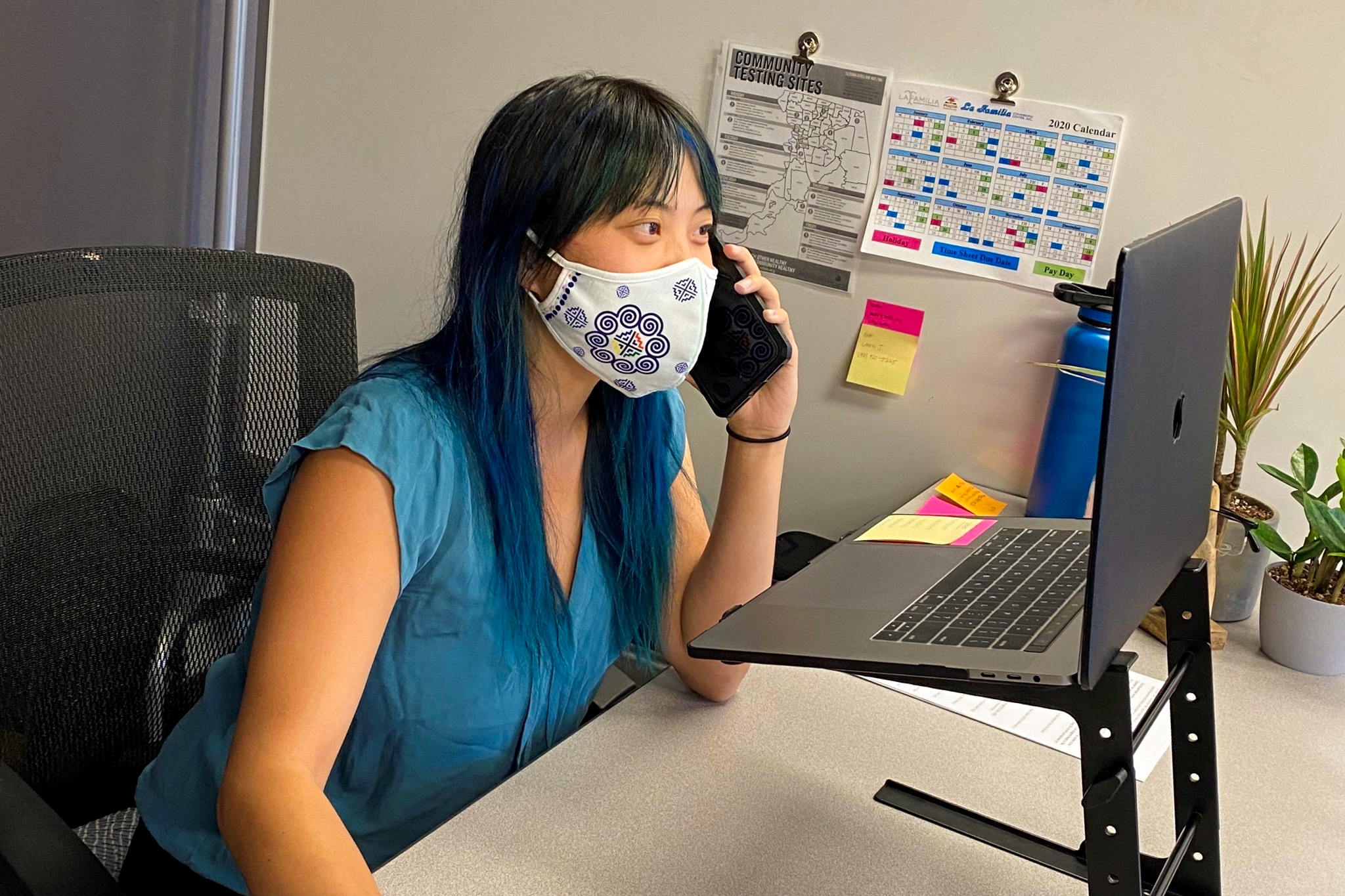
By Cynthia Hubert
In the ongoing battle against COVID-19, Sacramento State student Julie Vue is a crucial link between local health officials and her native Hmong community.
Vue's job as a contact tracer is to reach out to local Hmong residents who test positive for the potentially deadly virus that causes COVID-19, offering information and resources designed to help stop its spread.
Vue is part of a Sacramento County effort that collaborates with various nonprofits serving harder-to-reach communities of people, including Latinx, Middle Eastern and Hmong, who have been disproportionately affected by the pandemic.
"Once they realize that you’re calling because you care about their health and want to offer help, most people are really open to it.”
“Hmong can be difficult to reach because they are not very social” outside of their culture, Vue said. “They are tight with one another, but many don’t speak English and are not always educated about COVID” and the importance of face coverings, sanitizing and quarantining to keep the virus in check.
Vue, a third-year pre-Nursing student from Merced, has the knowledge and background to connect with people who otherwise might not receive critical information about the virus, said her supervisor at La Familia Counseling Center, where she is based.
“It’s important to have people like Julie who understand these communities and their struggles, who speak their language,” said Mao Vang, the organization’s Youth and Health Program manager who also is Hmong. “They are able to build trust and rapport, and that’s good for everyone.”
Sacramento County, in partnership with the Sierra Health Foundation, is hiring ethnically and racially diverse contact tracers such as Vue to help immigrants, refugees and members of minority groups protect themselves during the pandemic, as well as build confidence in the government and the public health system. The tracers, using a list provided by the county, call people who have tested positive for the virus, offer information about prevention and answer questions. They check in regularly with quarantined clients.
Promising strict confidentiality, the tracers help bridge cultural divides and correct misinformation about the virus while offering resources to clients and their families.
Vang said she thinks Hmong people generally feel shame in admitting they need help and often are reticent to admit as much. This makes building patient rapport critical.
“The more they trust you, the more they will share with you,” she said.
At Sac State, Project HMONG is working with community organizations and others to help connect Hmong people with medical professionals who speak the language, said Chao Vang of SASEEP, the University’s Student Academic Success and Educational Equity Programs.
The virus has presented “a cultural and linguistic challenge for many Hmong families,” he said, adding that restrictions on large gatherings and celebrations have turned the nature of weddings, funerals and other ceremonies on its head.
Project HMONG also has distributed literature about COVID-19 to area residents, and actively encouraged people to be tested for the virus and follow prevention protocols.
Vue, who works out of an office in south Sacramento, said her job as a contact tracer sometimes takes her in unexpected directions.
“At first it was pretty hard,” said Vue, who began her part-time work in July. “I was nervous because you never know how people are going to react. Are they going to hang up on you? But once they realize that you’re calling because you care about their health and want to offer help, most people are really open to it.”
Recently, Vue phoned an individual who had tested positive for the virus, telling the person she was collecting data for the county and emphasizing that everything they discussed was confidential. Hesitant at first, the client later revealed that another person in the household had tested positive, and that neither of them could leave the home to buy groceries.
Vue helped arrange delivery of emergency food boxes and checked on the family regularly during their recovery.
Other conversations have led to revelations about financial needs, emotional and psychological strain and housing issues. Vue and other contact tracers can help clients obtain help in these areas and more.
Vue, who aspires to a career as a nurse anesthetist, said her work as a COVID tracer is eye-opening and rewarding.
“It’s super nice to know that I’m helping to make a difference, and that I am here for the community,” she said. “It makes me feel really good about myself.”